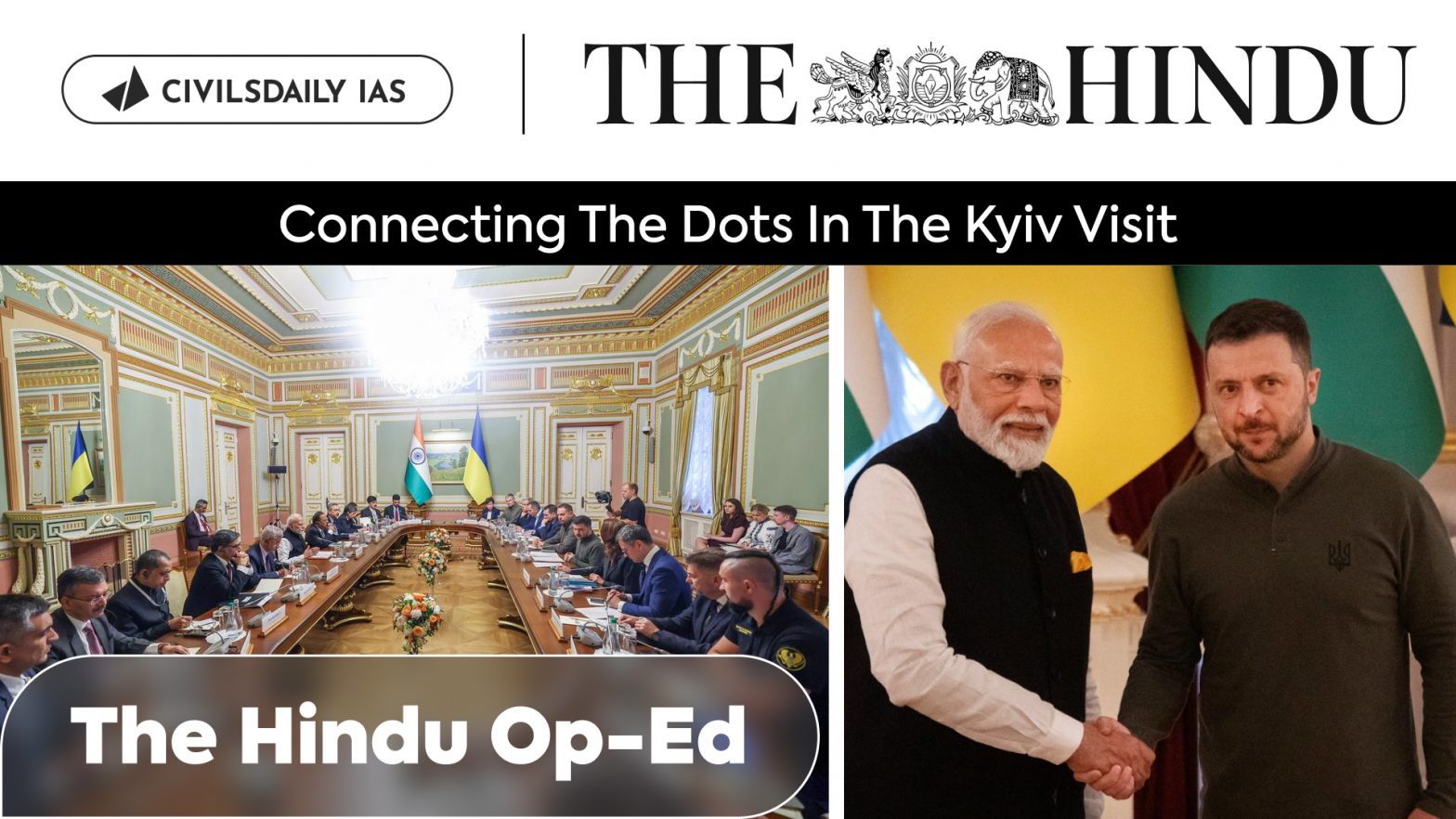| PYQ Relevance: Q Russia and Ukraine war has been going on for the last seven months. Different countries have taken independent stands and actions keeping in view their own national interests. We are all aware that war has its own impact on the different aspects of society, including human tragedy. What are those ethical issues that are crucial to be considered while launching the war and its continuation so far? Illustrate with justification the ethical issues involved in the given state of affairs. (2022) Q “What introduces friction into the ties between India and the United States is that Washington is still unable to find for India a position in its global strategy, which would satisfy India’s National self-esteem. (2019) |
Mentors’ Comment: PM Narendra Modi visited Kyiv (Ukraine) and met with President Volodymyr Zelenskyy on August 23, 2024. This was the first visit by an Indian PM to Ukraine since its independence in 1991. The visit garnered significant global attention, particularly regarding India’s potential role in mediating the Russia-Ukraine conflict.
Despite India’s cautious stance, PM Modi emphasized India’s commitment to supporting Ukraine’s sovereignty and territorial integrity. He advocated for a peaceful resolution through dialogue, stating “No problem can be resolved on a battlefield.” India has maintained a neutral stance, abstaining from UN resolutions critical of Russia while advocating for direct dialogue.
Let’s learn –
Why in the News?
There are strong reasons to believe that Prime Minister Modi’s visit to Ukraine may have included a peace initiative as part of its agenda.
India’s Consistent Foreign Policy Approach:
- Non-Alignment and Strategic Autonomy: India’s foreign policy is historically rooted in non-alignment and strategic autonomy, focusing on balancing relationships with global powers and addressing territorial disputes peacefully.
- Neutral Stance on Russia-Ukraine Conflict: Since the Russia-Ukraine war began in February 2022, India has maintained neutrality, avoiding condemnation of Russia, which has drawn criticism from Western nations.
- Foreign Minister S. Jaishankar has indicated that India might be interested in mediating the conflict between Russia and Ukraine, if approached but would not initiate the mediation on its own.
- Commitment to UN Principles: India advocates for respect for the United Nations charter and peaceful resolution of disputes through international institutions like the UN.
A Possible Broader Strategy
- Peace Initiative: The Indian Prime Minister’s visit to Ukraine involved a peace initiative, though enhancing bilateral relations with Ukraine appears unlikely due to India’s lack of dependency on Ukraine for trade, defence, or technology.
- Balancing Act: The visit could be a balancing act following the PM’s visit to Russia, positioning India as a neutral party and reinforcing its role as a responsible global actor committed to peace.
- Active Mediation Role: The visit may align with a broader strategy for India to take a more active role as a mediator or “communicator,” leveraging its ties with both Moscow and Washington.
- Global South Involvement: India, as a prominent member of the Global South, aims to contribute to peace efforts, reflecting its role in international negotiations.
Interests of Key Stakeholders
- United States: The U.S. prefers negotiations from a position of strength. A temporary ceasefire or limited peace agreement facilitated by a neutral party like India could relieve conflict pressures and allow President Biden to focus on other foreign policy issues.
- European Countries: Europe seeks a resolution to the conflict to address economic hardships and energy security concerns exacerbated by the war. A temporary peace could ease these challenges and provide breathing room.
What should India do further?
- Leverage Diplomatic Neutrality to Facilitate Dialogue: India should continue to maintain its neutral stance and offer to facilitate dialogue between Russia and Ukraine. By positioning itself as a neutral mediator, India can help create channels for communication, potentially leading to a ceasefire or limited peace agreement.
- Engage with Global South and Key Stakeholders: India should actively engage with other Global South countries and key stakeholders, including the U.S. and European nations, to build consensus on a peaceful resolution.
- Balance Relations with Global Powers: India should carefully balance its relationships with both Russia and the West. By maintaining strong ties with both sides, India can ensure its strategic autonomy while contributing to a peaceful resolution.
Conclusion: Successfully mediating the conflict could elevate India’s global stature and align with his vision of India as a “Vishwamitra,” actively contributing to global peace and security. However, achieving even temporary peace is challenging due to deeply entrenched positions and the involvement of numerous international actors in the conflict.
https://www.thehindu.com/opinion/lead/connecting-the-dots-in-the-kyiv-visit/article68582527.ece

